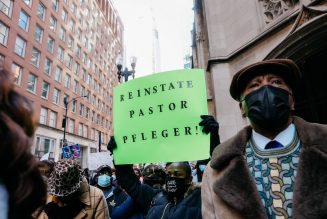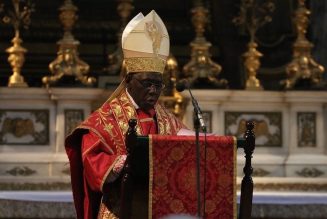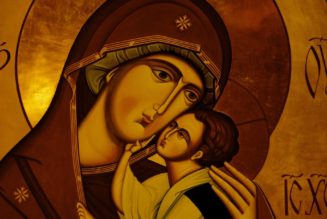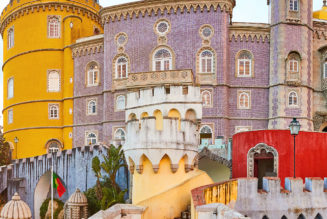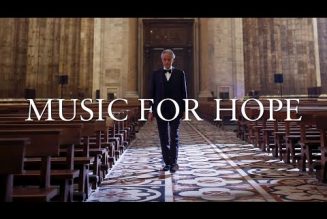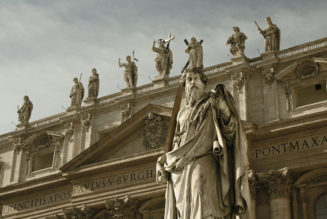But when the disciples saw him walking on the sea, they were terrified, saying, “It is a ghost!” and they cried out for fear. —Matthew 14:26
I have always liked Halloween as a joke that’s hard to get. The joke, as I see it, is that death is something to smile about, even laugh about. G.K. Chesterton saw things similarly and wrote winkingly in his poem “The Skeleton”:
Death was but the good King’s jest,
It was hid so carefully.
And that jest certainly is carefully hidden, especially to those in this “muddy vesture of decay,” as Shakespeare called our mortal flesh. It is difficult to understand such cosmic or mystic (or cryptic) humor, but I enjoy the challenge of it, just as I enjoy the challenge this shivering time of year poses with bumps in the night concerning those who have passed away. Dare we, as Catholics, say ghosts?
There is an idea about ghosts, about those uncanny spirit-like presences, that I have picked up in talking with old men in quiet rooms, and, to those willing to entertain some ghostly speculation with me, read on.
I work in a massive century-old brick building that used to be an orphanage. Many souls have passed through this place. Many have laughed, suffered, wept, and even died within these walls. It is one of those structures with secrets and memories. We all know places like this—places with an aura, that give a feeling, whether good or bad.
In our building, there is a very long, narrow, ill-lit, seldom-used hallway up on the third floor. This passage has a series of closets on one side and what used to be nuns’ cells on the other. Believe me, it looks as forbidding as it sounds. And believe it or not, strange things have been said about this hallway for years.
The closet doors will sometimes be found mysteriously unlocked and ajar. Further, there are several reports of a shadowy form at the dark end of the hall appearing where there isn’t enough light to see anything, but this form can still be seen. Sometimes there are soft, swishing sounds, like a broom.
Though this may seem material for just another ghost story, the sweeping nun of the third-floor hall is something quite real for the boys at our boarding school. She is accepted as one might accept a mouse or a creaky floorboard. These things just happen in old places.
But is it just childish hocus-pocus? Or is there something to all that “stuff and nonsense” about ghosts that go down the centuries? Does it go against the grain of our beliefs to believe in ghosts? Granted that much of haunted history is laced with hoax and illusion, personally, I cannot count myself among the dismissive. For, truth be told, I have seen the third-floor phantom myself. I myself have repeatedly locked up the doors to those dusty, dark closets that are inexplicably opened again and again with something like insistence. But is it right to call that hall “haunted” and keep a straight face—and a straight faith?
The Church has no doctrinal position on the matter of ghosts and, as Jung recommended, let us not fall into the “fashionable stupidity” of calling a fraud that which we fail to explain. So, what might be said of ghosts from anything like a Catholic perspective, something that does not contradict Catholic theology? Is there any way that we can entertain what people would call “ghosts” without interfering with Heaven, Hell, and Purgatory?
Certainly, those strange apparitions and manifestations that strew antiquity and report and legend cannot be simply dismissed out of hand—especially by those who believe in the visible and the invisible. “The dead often do appear to the living,” writes philosopher Peter Kreeft. “There is enormous evidence of ‘ghosts’ in all cultures.”
We are spiritual beings. We have souls, we bear the image of God. But, what’s more, all beings, whether they have souls or that divine Image or not, have some spiritual dimension or spiritual aspect because existence itself is a type of supernatural reality. God is being, He is existence, He is; and all things must have a spiritual element, or be part of a spiritual plane, insofar as they participate in God’s existence.
As spiritual beings moving and living against the spiritual fabric of everything, whatever that means exactly, we can perhaps, by some mystery, make and leave invisible impressions in that invisible atmosphere that surrounds us. These might be caused, we can imagine, in moments of tremendous spiritual consequence—moments of profundity, sadness, violence, death—and it is that impression only, like an image in wax, that can manifest itself in things like doors, sounds, furniture, or even apparitions.
Such spiritual remnants, such lingering energies, may be what people have recognized as ghosts or ghostly presences. Whatever they are, though, I believe that they are not thinking, sentient beings that can see us or speak to us, but rather more like photographs or footprints left behind by some powerful spiritual event. Maybe a murder, or maybe a Mass.
There’s a story about a priest, a man of musical studies, in a European country who went to a parishioner’s house for dinner. When he arrived, he asked after the children. Their mother said they were in the next room playing under the table. “Under the table?” The priest asked. “Yes, they seem to like playing under there for some reason.” Approaching the table where he could hear the little voices, the priest pulled aside the cloth to greet them.
But as he did so, he paused. The children were singing a form of ancient chant—nothing they would have picked up going to church. The priest recognized the music and was taken aback. “Who taught you to sing that?” he asked. The children paused in their song, looked at the priest, and said matter-of-factly, “The table taught us.” The priest traced the antique table to a period and place where it appeared it had been used as an altar during a time of persecution—a time when such chants may well have been sung at Mass.
In short, according to these musings, spiritual beings and events may be able to make a mark upon a place. In other words, we change the places where we live, where life happens. We leave behind wispy human traces, enduring memories—or hauntings. That is one way of thinking about it, at least, in order to assign some cause to the unaccountable events that so many have experienced without transgressing the doctrines of what happens to the soul after death.
But it is remarkable how, for the most part, when a ghost is seen, it is rarely doing anything of tremendous consequence but just something mundane. It opens doors or sweeps hallways. They flit and float and stare. How these mundane manifestations fit in with the idea of moments of spiritual significance can point to how the simplest things in our lives can be of eternal moment. For all we know, that hallway and a broom were the means of a nun’s salvation.
Of course, there are approved and pious theories and teachings regarding the appearance of souls from purgatory begging for intercession. There are unambiguous instances when the damned have appeared to terrify or terrorize. There are times when the blessed have communed with those on earth. But none of these spiritual demonstrations, which St. Thomas Aquinas famously wrote about, are ghosts in the way that we are imagining them. And there is, of course, plenty of room for speculation when thinking of the specters, being a subject that we can solely speculate about on this side of God’s grace.
As airy as all this is, ghosts bear a solid import, especially if they are depicted as funny or silly on Halloween. This is perhaps where Halloween’s modern problems are deepest, with its emphasis on the flesh, violence, sickness, mutilation, the focus on the physical as though it’s all that there is, which would really be a horror. We rarely see those playful imps and sprites that smilingly suggest the supernatural or an afterlife. The only afterlife we see portrayed is that of the undead, the zombie, whose afterlife is not life at all, but just the walking dead.
Ghosts are suggestive of a realm that defies the material ideals of a self-obsessed world that has abandoned Christ. With this loss, society is reverting back to the vulnerable darkness of pre-Christian eras, giving the devil renewed sway. So, let Halloween retain its howling ghosts, I say; and at the same time, keep your eyes and mind open, so that even fearful phenomena can draw us closer to the Holy Ghost.
[Image Credit: Unsplash]
Join Our Telegram Group : Salvation & Prosperity


